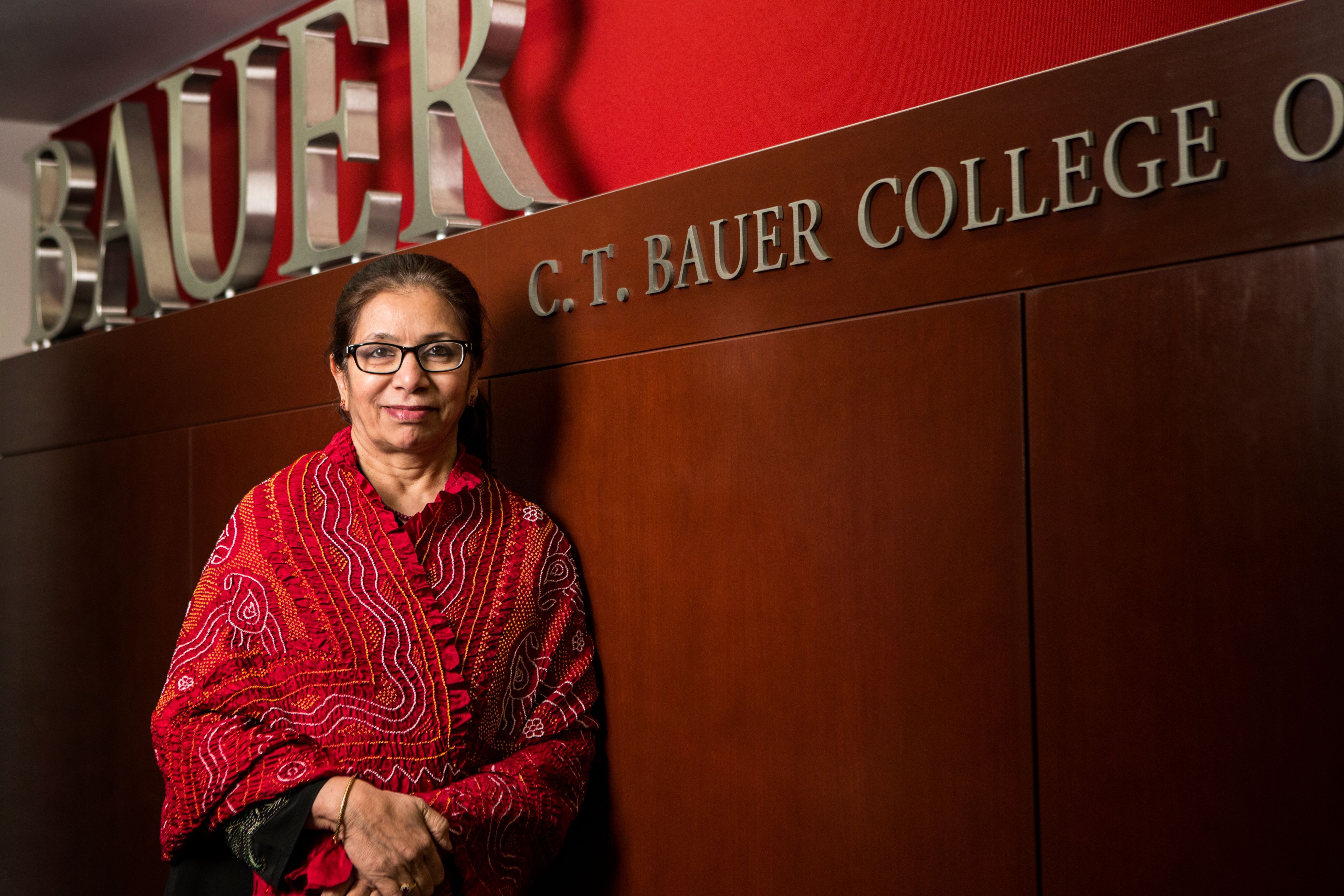Empowering Tomorrow’s Entrepreneurs
The SURE program allows students to gain the hands-on experience employers look for while uplifting the local economy alongside Houston entrepreneurs.
By Professor Saleha Khumawala, as told to Shawn Shinneman

In the early 2000s, not long after I’d taken a group of students to explore the work of nonprofits in my native India, including in the slums of Mumbai, one of them walked into my office with a proposition. He wanted me to teach him the world of microfinance.
I knew that project-based work—not textbooks—was the way to grasp the market, and we soon had him enrolled in an independent study. What I didn’t realize at the time was that his inquiry was just scratching the surface of the interest across the C. T. Bauer College of Business.
Some 20 years later, that one independent study has slowly evolved into a thriving program named SURE—Stimulating Urban Renewal Through Entrepreneurship. The SURE program, which was founded in 2012, receives some 1,000 applications each year from under-resourced entrepreneurs across the Houston area, about 120 of whom are admitted to the program and paired with MBA student-mentors from the College of Business.
Learning Together
The SURE program creates a symbiotic relationship that’s incredibly valuable for both sides. Throughout the semester, I make it a point to address our students as consultants. That’s what they put on their resumes, which has proven to be a differentiator during interviews. And they are consultants in the truest sense of the word. Each student-consultant takes on three or four businesses in an active learning “classroom,” where they sit together with entrepreneurs at round tables, discussing real ideas and working to solve genuine business problems.
The local entrepreneurs they’re helping come from all walks of life, but they’re connected by the fact that they lack some key drivers of business success—education, a network and access to capital. SURE provides all three.
We start each semester with lessons on financial literacy to help the group of entrepreneurs get their personal accounts and habits in order, creating a stable base for their company. We then empower their business efforts with financial education and skills training. At the end of the semester, we run a pitch day that is a more friendly fish tank than Shark Tank. We call it “Aquarium.”
Entrepreneurs inevitably end up exchanging cards with bankers and investors who serve as the event’s judges. Rounding out the cohort’s new network are the executives who volunteer their time to mentor our consultants; they are present and often willing to hold court with hordes of entrepreneurs and students alike.
It has been incredible to watch how the community has banded together around our efforts. In addition to the executives, several law firms provide pro bono legal advisement as our entrepreneurs set up limited liability companies and navigate the specific regulatory waters of their industries.
“ It’s proof that we all benefit when we create a more inclusive business ecosystem.”
Ensuring Success
Through the SURE program, we’ve helped launch more than 725 businesses. Imagine the number of jobs and revenue that have been generated from those 725. I’m so proud of the imprint we’re leaving on Houston. It’s proof that we all benefit when we create a more inclusive business ecosystem.
But I may be even prouder of the nonnumerical indicators of success, the less measurable but every-bit-as-real impact at an individual level. There’s always a point in the semester when things begin to click for our cohort—when the mentorship and training meet real confidence and a sense of self. It’s the way our entrepreneurs are uplifted both socially and emotionally that is so incredible to see. They’re able to go back home and tell their networks they go to the University of Houston. We have a graduation each year with prominent speakers and attendees, from the mayor to former high-ranking state officials.
Some people have asked whether I consider it a failure to go through our program and not come out with a viable business. I very much do not. According to the Bureau of Labor Statistics, one in five businesses fail within their first year of operation. Our mentorship allows folks to understand what it will take to make their idea a reality and whether the juice is worth the proverbial squeeze. There are many times when they decide it is not. But in my opinion, they still benefit greatly from the guidance and network and may soon find another venture that is more profitable or more conducive to their way of life.
As interest in our program grows, I’m excited about how SURE will evolve. One year ago, we established an academic center of excellence called the Musa and Khaleda Dakri Center for Economic Inclusion on campus. It houses the SURE program, but we’re now also doing cutting-edge research on the intersection of small business and higher education. Many people can tell you what number of businesses fail, but there’s not enough research into the drivers of that failure. That’s the gap we’re working to bridge.
The SURE program was built on our students’ empathy. Who knew that one trip to India two decades ago would set the wheels in motion to create this thriving community?
The Sure Program
Stimulating Urban Renewal Through Entrepreneurship
1,000
Applications received yearly
240
Businesses admitted yearly
725
Businesses launched since 2012





